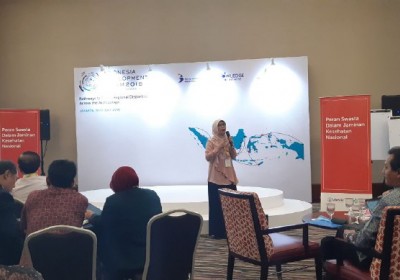Expanding Health Access Through Private Sector
July 11, 2018
Assistant Deputy for Utilization and Anti-fraud Referral BPJS Health Elsa Novelia at Special Session VI: National Health Insurance and Private Sector, Indonesia Development Forum 2018, Wednesday, July 11, 2018.
Jakarta July 11, 2018 - Disparity in health sector is marked with different number of health facilities from one region to another. According to Assistant Deputy of Referral Utilization and Anti-Fraud of BPJS Health, Elsa Novelia, the issue of facility disparity can be seen from two aspects.
“The problem is associated with unequal distribution of facility and lack of number of beds,” Elsa said during Special Session VI: National Health Insurance and Private Sector, Indonesia Development Forum 2018, Wednesday, July 11, 2018.
Elsa argued that this issue can be addressed by involving private sector. Elsa hoped private sector could play more active role to build hospital and primary health facility in remote areas. He expected construction of health facilities would come along with improvement of service quality and health security by using the National Health Security standards.
“Not only primary health facilities and hospitals, but also pharmacies that serve JKN beneficiaries,” she added.
In line with Elsa’s statement, the Director General of Health Service, Ministry of Health, Bambang Wibowo, explained that government must increase public participation in the National Health Security scheme. Improvement should only be done on health service tariff that will be applied to hospitals and health facilities, including ones from tourism sector.
“It’s hoped that not only private hospitals can keep up their quality, but hospital business will also grow,” Bambang added.
Up to date, 49% of hospitals have become National Health Security (JKN) partners across the country. Primary health facilities that joined as JKN partners constitute 60%.
The Head of National Health Security Compartment of the Indonesian Private Hospital Association, Fajaruddin Sihombing, said that private hospitals need three certainties prior to deciding to build a health facility across Indonesia. The certainties are associated with sufficiency of payment, speedy payment, and program sustainability. If the market is there, Fajar guaranteed that there will be many private actors interested to build health facilities in all corners of the country.
Addressing inter-regional disparity in Indonesia cannot be undertaken by the government alone. Participation from all stakeholders, including private sector, are critical. Therefore, the National Development Planning Agency (Bappenas), with the support from the Government of Australia through Knowledge Sector Initiative (KSI) held the Indonesia Development Forum 2018.
IDF 2018 is held under the grand title of “Pathways to Tackle Regional Disparity Across the Archipelago”. The forum promotes more equal and sustainable development acceleration in Indonesia that is based upon science, relevant experiences, and facts. The results will be used as a reference to develop the Mid-Term Development Plan of 2020-2024.**
Indonesia’s Research Institutions Supporting the Development of the Electric Vehicle Industry
Indonesian Muslim Fashion and Cosmetics IKMs Shine at Dubai World Expo 2020
Govt Steps Up UMKM Transformation Efforts in the Midst of Pandemic Slowdown
Govt Encourages Promotion of IKM Products in Digital Era
Government Begins Developing Maritime Training Center in Makassar
Tweets by IDDevForum
